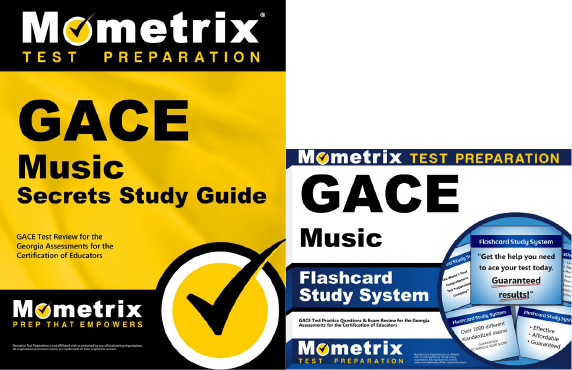If you need help studying for the GACE Music test or just want some more information about what the test is like, you’ve come to the right place!
Click below to take a free GACE Music practice test!
What’s on the Test?
The GACE Music test contains 160 multiple-choice questions and is timed at 4 hours.
The exam is split into two subtests, which are taken in separate testing sessions (but can be taken on the same day if you’d like).
SUBTEST I (111)
80 questions | 2 hours
Aural Skills and Analysis (30%)
- Identifying errors in student performance
- Analyzing music in aural form
- Recognizing melody, harmony, and rhythm
Composition and Improvisation (20%)
- Interpreting and analyzing music in written form
- Basic music theory concepts related to composing, orchestrating, and arranging instrumental and vocal music
- Basic improvisational techniques
History and Repertory (20%)
- Various world musical styles
- The history of major developments in musical style
Performance Competencies for Music Educators (30%)
- Basic conducting techniques
- The interpretation of notation and expressive elements for performance
- Preparing a musical score for rehearsal and performance
- Instrumental and choral/vocal warm-up techniques
- Instrumental and choral tuning/intonation techniques
- Basic accompaniment techniques
SUBTEST II (112)
80 questions | 2 hours
Technology (20%)
- Current technologies used for performance and recording
- Incorporating technology and instructional software into the classroom
- Desktop music-publishing software for pedagogical purposes
- Appropriate and ethical uses for music software and internet technology
Teaching Competencies for Music Educators (60%)
- Instructional strategies for different class settings
- Planning and instruction standards
- Classroom management techniques
- Planning and differentiating instruction
- Modifying instruction to accommodate student needs
- Selecting appropriate repertoire for the classroom
- Instrumental techniques
- Vocal and instrumental performance challenges
- Developing sight-reading skills
- Common pedagogical approaches
- Teaching various musical concepts through performance literature
- Fostering musically expressive experiences
- Integrating concepts used in the fine arts
Professional Knowledge and Synthesis (20%)
- Professional ethics and legal issues specific to music teaching
- Professional organizations and resources in music education
- Current trends and issues surrounding music education
- Contributions to the history and philosophy of music education
- Philosophical reasons for inclusion of and advocacy for music in the curriculum
- Collaboration with colleagues
- Learning through two-way communication
- Basic administrative responsibilities
- External influences that affect the music program and curriculum
- Available career opportunities in music
- Promoting physically healthy performance practices
How to Register
To get started with the registration process, you’ll need to create a MyPSC account on the GaPSC website. You should receive a Georgia Certification ID (GA CERT ID) during this process, which you’ll use for identification throughout the registration and testing process.
The next step is to create an ETS GACE testing account on the ETS website. This account will allow you to register for the exam and pay the testing fee(s). If you take each subtest separately, the fee is $123 for each subtest. If you take both subtests together, the fee is $193.
How the Exam is Scored
The GACE Music test is scored using a scaled scoring method. Here’s how it works:
For every question you answer correctly, you get one point added to your raw score. At the end of the test, your final raw score will be converted to a scaled score. You’ll need a scaled score of at least 220 to pass the exam.
The reason your raw score is converted to a scaled score is because everyone that takes the test is given a slightly different set of questions. Since everyone has a different arrangement of questions, and because some questions are harder than others, converting your raw score to a scaled score ensures a more even playing field.
Passing Scores
There are two passing levels for this exam: induction and professional. Each level has its own minimum passing score requirements:
- Induction Level: 220-249
- Professional Level: 250
Here’s something to keep in mind: You have to pass at the professional level on BOTH subtests in order for your final exam scores to count at the professional level. If you only pass at the induction level on one of the subtests, your final exam score will only count at the induction level.
Retaking the Exam
If you don’t get the score you want on your first try, that’s okay! You can take the exam again after a mandatory 30-day waiting period.
FAQs
How many questions are on the GACE Music exam?
The exam contains 160 questions (80 questions on each subtest).
What is the time limit for the GACE Music exam?
The exam is timed at 4 hours (2 hours per subtest).
What is the passing score for the GACE Music exam?
You’ll need to get a final scaled score of at least 220 to pass.
How much does the GACE Music exam cost?
The testing fee is $193.



 GACE Study Guide
GACE Study Guide GACE Flashcards
GACE Flashcards